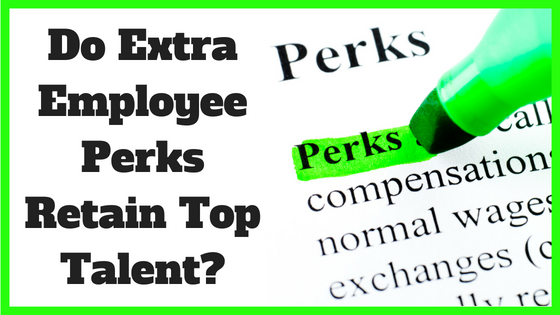Do Extra Employee Perks Retain Top Talent?
Work-life balance is becoming more challenging as the tech industry continues to grow and change how people work. Mobile technology and connectivity in the workplace has created a sense of “always on†for most employees. We carry our offices in our pockets during the day and they’re on our nightstands when we go to sleep. The incredibly high competition in the tech industry is driving employees to accept this new lifestyle, whether they want to or not.
In an attempt to regain a better sense of work-life balance, forward-thinking companies are deploying a variety of employee benefits, like flexible scheduling and allowing employees to work from home, in the hopes of boosting satisfaction and retention. The question is, are these perks achieving that goal of providing work-life balance in the modern workplace and retaining top talent?
What’s being offered?
First, let’s take a closer look at the types of benefits being offered.
Remote work
Allowing employees to work from anywhere gives them the flexibility they need to work in a way that suits their lifestyle. On the flip side, it allows employers to recruit from anywhere in the world and retain top employees that need to relocate by providing a remote option.
Extended health benefits
Employers are going beyond simply offering health insurance to their employees. Many companies are investing in the health of their employees by building on-site fitness centers and locker rooms. Some also pay out employee health stipends to help with gym membership costs, or partner with local facilities to offer exclusive discounts. Some companies even bring nutritionists and trainers in the office for personal consultations.
Live-in campuses
Large tech companies like Google and Oracle are going one step further and are building housing and other impressive facilities for their employees. Oracle’s campus, for example, includes amenities like swimming pools, fitness centers, and restaurants. According to Oracle’s CEO Mark Hurd, their investment in an employee campus is focused around supporting recent college graduates:
“Many of these kids, when they get out of school, their biggest issue [is] cash flow. [We want to] give them a housing advantage,†said Mark Hurd to Business Insider
This is a great recruiting tool to attract recent graduates by taking away the stress of finding housing right out of college.
Flexible schedules
The ability to work from a home office is one thing, but being able to set what hours during the day you’ll be “on the clock†is an incredible benefit. Until recently, employees have been required to plan their lives around work. When employers allow for flexible scheduling, employees can plan work around their lives. If you are more focused in the morning, working from 7am-3pm is a much better schedule. If you are less of a morning person, 10am-6pm could be right for you. Either way, young professionals value the ability to set these schedules on their own terms and not be locked into the typical 9-5.
Do they work?
These are some examples of the biggest trends in employee perks. But the key question becomes, do they work? Are tech companies seeing an increase in employee productivity, happiness, and retention by providing these new-age benefits?
The short answer, unfortunately, is inconclusive. Tech companies are still experiencing high rates of employee turnover. Amazon and Google are #2 and #4, respectively, in employee turnover out of the fortune 500 companies. This isn’t to say these methods don’t attract highly qualified individuals and work to improve satisfaction for those who do stay, though. With the current talent gap in the tech industry, attracting skilled employees is more important than ever. So why is it that turnover rates are still so high?
There are some surface-level explanations. The employees at these companies tend to be younger and without families or mortgages, and it’s arguably easier for them to move jobs and  locations if they’re feeling unfulfilled. Also, “fringe†benefits are easily outdone by the competition. It isn’t difficult for competitors to find out what other businesses are offering, then offer slightly more.
Regardless of what generation an employee comes from, however, we know they care about the same things. Studies have compared Baby Boomers, Gen-Xers and Millennials to find that their workplace values are not that different. At the end of the day, most employees want fair pay, recognition for good work, and a sense of purpose. These are the traits of a company that earns loyalty with their employees.
Companies are finding out that attracting talent with good benefits is not enough. Building campuses where you can live and work, offering free food and onsite fitness centers will get people in the door, but it’s not always enough to keep people happy at work.
Thinking of hiring a career coach to help you find your dream job? Browse our directory of career coaches and get a FREE consultation or request a personalized coach recommendation!
Related reading:
About the Author Brian Thomas
Brian Thomas is a contributor to Enlightened-Digital.com, long-distance cyclist, and lifelong advocate for women in business from Philadelphia. Tech and business are my lifeblood, but I’m also a fanatic of brewpubs and just about every sports team in Philadelphia!


